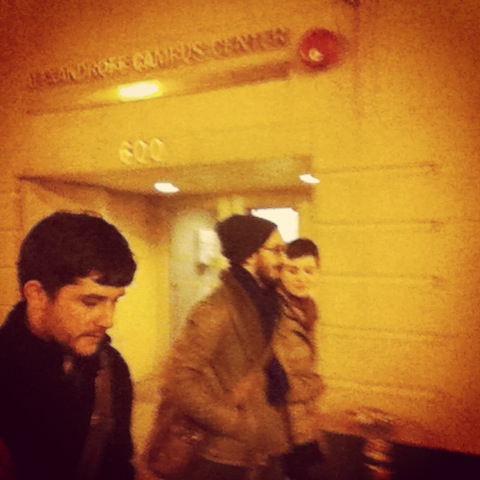
What is So Great About Columbia College Chicago? Well…
[flickr id=”8473929381″ thumbnail=”medium” overlay=”true” size=”original” group=”” align=”none”]
The truth of it is that I’m ready to be done with school. I’ve pretty much been going nonstop since I was 24 and starting the second half of my BA in English. I went straight to my MA in English, then straight into an MFA at NMSU. OK, I did take a year off, but my son was born that year, and I was working as a instructor of English and at the front desk of a hotel. It was a busy time—it wasn’t a break. Then I came to CCC. It’s been amazing, and even my classes now are great, and I’m invested in them. But…I still want to be finished.
I had a talk last night with my friends Jacob and Meg about this, about how sad it is. I’m going to miss all my friends! I’m going to miss my profs and boss and these amazing Columbia students. Sure, there’s a small chance I’ll end up adjuncting here and living in Chicago, but at this point in the game, it’s not looking likely.OK, so I’ve been praising this program since day one. What’s so great about it? Why did I leave another program for this one? Was it the right decision? What makes this different from other graduate programs?
As you may, know I’ve been to two other graduate school and one other MFA, and I won’t say anything bad about the other two (mostly because I learned so much and know that these programs are amazing!), but I will say that there are some really specific things I’ve noticed in the Creative Writing – Poetry MFA program at Columbia that make this school stand out.
1) There is a diversity of poets here. And not just the students—the faculty too. I mean, we’ve got narrative poets, documentary poets, lyric poets, hybrid-poets, combinations of these, historical poets, pop-culture poets, appropriation poets, editors etc, etc, etc. And many of the poets here work in different modes.
Now, the faculty’s poetics—if you’ve read their stuff, then you know—range from L=A=N=G=U=A=G=E to pretty solid Narrative But, they are able to talk about modes they don’t work in. Most of the professors here know how to navigate the work even if it exists outside what they’re usually drawn to. And the poets here tend to mimic that range. It’s as though the faculty choose applicants based purely on the programs need to be poetically diverse. In fact, the program seems to be designed to house this kind of collective of poets and writers. This leads directly to the next trait.
2) Student-centered learning. This I experienced at the other schools I attended, but I’ve spent more time meeting with professors and taking advantage of office hours in my first semester here than at all the other schools I attended, combined. The professors here also seem to go out of their way to make sure you’re thinking about jobs, submissions, grants, residencies, scholarships, awards, etc, etc.
[flickr id=”8475017086″ thumbnail=”medium” overlay=”true” size=”original” group=”” align=”none”]
4) You gain editorial experience with either Columbia Poetry Review or Court Green. These are two well-known and respected journals in the poetry community. This is a big deal.
5) Teaching. Not only are you trained and prepared to teach, but you also get to teach. Here, at an art school, in Chicago. Teaching, for me, is the most important part of the package when looking at schools.
6) School and off-site reading series. So so SO so many!
OK, I could keep adding on to this list, but it would go and go and go. So, I’ll call it here. Hit me up if you have any questions about the program and the options and opportunities.
Later,
J
PS My third book, The Diegesis, a collaborative collection written with Chas Hoppe, was released on Gold Wake Press February 15th. You can pick it up here and here.
&
You can watch the book trailer here.
